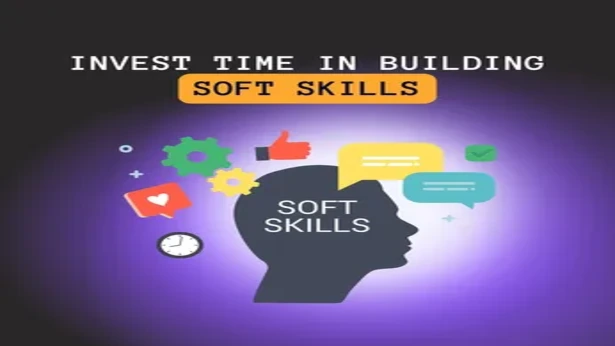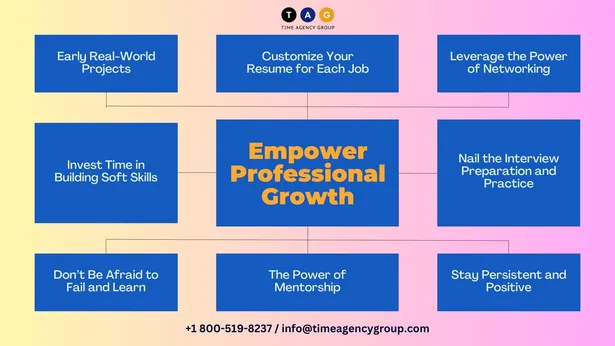As we speak, today is the most modern job market in history, with more candidates chasing a small set of opportunities. How you approach the process will enable you to make a distinction, create valuable connections, and build a brilliant future. Whether you’re seeking your first internship, gearing up for a career change, or trying to break into the tech world, a few key job search strategies can make all the difference in your quest.
Example: Imagine you built a software tool for the Small Business Administration using JavaScript/React/Node.js to help small businesses with their bookkeeping. It doesn’t have to be polished, but it serves as a demonstration of your proactivity and creativity within your field, showing your ability to take any project from A to Z.
Example: If you’re applying for a data science position, and the job description emphasizes Python and SQL, make sure those skills are front and center. Include career skills development and past projects related to the expertise needed, and while you may have other skills like R or Java, highlight transferable skills that can add value to the position.
Example: A student connects on LinkedIn with individuals from their dream company. After a few exchanges, they secure an informational interview, which leads to a formal one. Networking not only opens doors but also provides insights into industry trends and expectations.
Example: You’re at a job interview with a tech company. You’re asked to describe how you’d tackle a tough problem. The catch? You’ve got to make it clear for both a tech expert and someone from the sales team. Being able to break down complex ideas can be a game-changer in such situations.
Example: A software engineering candidate might be asked to use a sorting algorithm from scratch. Along with solving the problem, the interviewer may ask about time complexity and how the solution would scale with larger datasets. Preparing for these types of problems ensures you are ready for any challenge.
Example: Rejections led a software engineer to start contributing to open-source projects. This not only improved their coding skills but also expanded their network within the developer community. Eventually, this exposure led to a full-time position at a technology startup.
Example: A college student interning at a tech company was assigned a senior developer as a mentor. With weekly check-ins and feedback, the student gained deeper insights into technology and improved technical skills. This mentorship eventually helped them secure a full-time position.
For instance: picture a data analyst, who after months of trying, landed a job in a company they hadn’t even considered before. The takeaway? Stay hopeful, never stop improving your job-related skills, and don’t give up on your job search.
Stay up-to-date on Time Agency Group latest IT job market trends and industry news.
Early Real-World Projects
One of the best ways to distinguish yourself is through tangible projects that showcase how skilled you are and the problems you can solve. Real-world projects prove your competencies and give you practical experience beyond theoretical knowledge. As a software engineer, for example, instead of following tutorials, try making something from scratch. A simple app or website can show your capability to work independently and solve real-world problems.Example: Imagine you built a software tool for the Small Business Administration using JavaScript/React/Node.js to help small businesses with their bookkeeping. It doesn’t have to be polished, but it serves as a demonstration of your proactivity and creativity within your field, showing your ability to take any project from A to Z.
Customize Your Resume for Each Job
While tempting, it’s seldom effective to send the same resume to numerous companies. Instead, focus on creating tailored resumes for each job by emphasizing the skills and experiences that most closely match the job description. Employers want to see evidence that you’ve taken the time to align yourself with their specific needs.Example: If you’re applying for a data science position, and the job description emphasizes Python and SQL, make sure those skills are front and center. Include career skills development and past projects related to the expertise needed, and while you may have other skills like R or Java, highlight transferable skills that can add value to the position.
Leverage the Power of Networking
Often, networking yields job opportunities that never make it to job boards. Start with your current network, including friends, family, and alumni, and grow it through industry events or online participation. LinkedIn is a powerful tool for professional networking and offers opportunities to connect with leaders and recruiters in a given industry.Example: A student connects on LinkedIn with individuals from their dream company. After a few exchanges, they secure an informational interview, which leads to a formal one. Networking not only opens doors but also provides insights into industry trends and expectations.
Invest Time in Building Soft Skills
Yes, being a tech whiz matters, but your ability to interact with others matters just as much. Jobs require teamwork, adaptable people, and effective communication. If you can figure out tough problems and put your solutions into words everyone can grasp, you’ll shine. It’s not about impressing with jargon. It’s about helping others understand, whether they’re from your department or not.Example: You’re at a job interview with a tech company. You’re asked to describe how you’d tackle a tough problem. The catch? You’ve got to make it clear for both a tech expert and someone from the sales team. Being able to break down complex ideas can be a game-changer in such situations.
Nail the Interview Preparation and Practice
Interviews are as much about how you communicate as they are about your technical knowledge. You should prepare for everything, from white-boarding coding problems to behavioral questions. Job search strategies such as practicing with LeetCode or HackerRank can significantly improve your performance in technical interviews.Example: A software engineering candidate might be asked to use a sorting algorithm from scratch. Along with solving the problem, the interviewer may ask about time complexity and how the solution would scale with larger datasets. Preparing for these types of problems ensures you are ready for any challenge.
Don’t Be Afraid to Fail and Learn
Fear of failure stops people from applying to jobs or pursuing projects they’re passionate about. However, with each setback comes a new learning opportunity. In fields like technology, where continuous learning is essential, this mindset is crucial.Example: Rejections led a software engineer to start contributing to open-source projects. This not only improved their coding skills but also expanded their network within the developer community. Eventually, this exposure led to a full-time position at a technology startup.
The Power of Mentorship
Having a mentor can be a game-changer in your career. A mentor provides guidance, constructive criticism, and assistance with tough decisions. While some mentor relationships develop organically, you can also actively seek out mentors within your industry.Example: A college student interning at a tech company was assigned a senior developer as a mentor. With weekly check-ins and feedback, the student gained deeper insights into technology and improved technical skills. This mentorship eventually helped them secure a full-time position.
Stay Persistent and Positive
Finally, persistence pays off. Looking for a job can be tough, especially when there’s a lot of competition. But remember, those who stick with it and keep a positive attitude often reach what they’re aiming for. Think of job hunting as an actual full-time job, dedicating a set amount of time every day for applying to jobs, making professional connections, and building up your skills.For instance: picture a data analyst, who after months of trying, landed a job in a company they hadn’t even considered before. The takeaway? Stay hopeful, never stop improving your job-related skills, and don’t give up on your job search.
Conclusion
In today’s job world, you need a mix of practical skills and people skills, as well as being persistent and good at making connections. Work on significant projects and customize your resumes. Constantly improve your job-related skills to boost the probability of getting your ideal job. Don’t forget, each phase is a chance to learn more. Be sure of yourself, never stop improving, and find joy in the process.FAQs
What’s in store for jobs in the future?
Take a look at the U.S. Bureau of Labor’s Employment Projections landing page for more details. They project an increase of 6.7 million jobs between 2023 and 2033. The healthcare and social assistance sector fuels most of this growth. The Occupational Outlook Handbook now highlights the 2023-33 projections, and tables detailing new skill requirements are viewable individually.So, how should you navigate this job market?
If there’s a particular company you’re interested in and you know someone on the inside, your network can be a real advantage. A personal introduction sets you apart from just being another applicant. Additionally, you can establish your network online using platforms like LinkedIn or in-person at events such as job fairs.Stay up-to-date on Time Agency Group latest IT job market trends and industry news.

5. Nail the Interview Preparation and Practice
Interviews are as much about how you communicate as they are about your technical knowledge. You should prepare for everything, from white-boarding coding problems to behavioral questions. Job search strategies such as practicing with LeetCode or HackerRank can significantly improve your performance in technical interviews. Example: A software engineering candidate might be asked to use a sorting algorithm from scratch. Along with solving the problem, the interviewer may ask about time complexity and how the solution would scale with larger datasets. Preparing for these types of problems ensures you are ready for any challenge.6. Don’t Be Afraid to Fail and Learn
Fear of failure stops people from applying to jobs or pursuing projects they’re passionate about. However, with each setback comes a new learning opportunity. In fields like technology, where continuous learning is essential, this mindset is crucial. Example: Rejections led a software engineer to start contributing to open-source projects. This not only improved their coding skills but also expanded their network within the developer community. Eventually, this exposure led to a full-time position at a technology startup.7. The Power of Mentorship
Having a mentor can be a game-changer in your career. A mentor provides guidance, constructive criticism, and assistance with tough decisions. While some mentor relationships develop organically, you can also actively seek out mentors within your industry. Example: A college student interning at a tech company was assigned a senior developer as a mentor. With weekly check-ins and feedback, the student gained deeper insights into technology and improved technical skills. This mentorship eventually helped them secure a full-time position.8. Stay Persistent and Positive
Finally, persistence pays off. A job search can be frustrating, especially in a competitive market. Those who remain disciplined and positive are more likely to achieve their goals. Treat the job search like a full-time job and allocate specific time each day for applications, networking, and skills development. Example: After months of searching, a data analyst found a job at a company that wasn’t initially on their radar. The lesson here is to stay positive, keep enhancing your career skills, and remain persistent in your job hunt.Conclusion
Success in today’s modern job market requires a balance between technical and soft skills for employment, networking, and persistence. Build meaningful projects, tailor your resumes, and continue honing your career skills to maximize your chances of landing the job you want. Remember, every step in the process offers a learning opportunity. Stay confident, keep growing, and enjoy the journey.Web Story
Infographics







